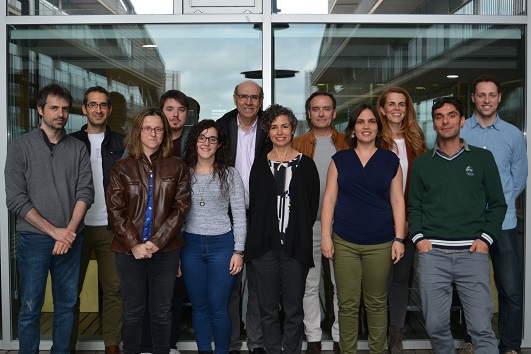The main goal of this group, led by Ferran Sanz, is to develop integrative computational strategies and tools that, through the reuse and exploitations of broad sets of data in terms of quantity and diversity, enable a better understanding of the disease mechanisms and the biological mode of action of drugs and other chemicals. We approach this scientific challenge from different perspectives, including:
- Systems medicine to identify disease patterns from scientific evidence by applying data mining and network modelling approaches.
- Systems toxicology to reveal molecular mechanisms underlying the toxicity of drugs and other chemicals and to develop predictive machine-learning models.
- Management and exploitation of real-world clinical data.
- Natural language processing to extract relevant information from free-text documents, including scientific publications, clinical records, and social media.
- Development of knowledge management resources in the areas of disease genomics and pharmaceutical R&D.
One of the key developments of the group has been the design and development of the DisGeNET knowledge base of gene-disease associations, which has become a world-wide recognized resource with thousands of users monthly and more than 4,000 bibliographic citations.
The group has a wide record of leadership and participation in international projects. In particular, it is currently coordinating a large-scale scientific initiative, the IMI project “eTRANSAFE: Enhancing Translational Safety Assessment through Integrative Knowledge Management”, which aims to develop an advanced data sharing and integration infrastructure together with innovative software tools to improve the safety assessment during the drug development process.
The group also maintains strong collaborations with the Parc de Salut Mar around clinical data reuse for research purposes, jointly participating in international initiatives in the field, such us the European Health Data Evidence Network or the EMA-funded DARWIN initiative.
Several scientists of the group have founded in 2020 the spin-off company MedBioinformatics Solutions SL, which is focused on providing computational solutions supporting the precision medicine and the pharmaceutical R&D. The company is currently consolidated with physical facilities and several full-time employees. The company shows a positive record of new products, commercial revenues, and participation in EU-funded projects.
The group is also partner in other EU-funded projects, like:
- ERAPerMed PROMPT, Toward PRecisiOn Medicine for the Prediction of Treatment response in major depressive disorder through stratification of combined clinical and -omics phenotypes.
- RISK-HUNT3R, RISK assessment of chemicals integrating HUman centric Next generation Testing strategies promoting the 3Rs.
- Disc4All, an european innovative training networks (ITN) which aims to train young researchers in the tools available to analyze genomic data (DisGeNET) and comorbidities (comoRbidity).
Other examples of recent european projects participated or coordinated by the IBI group are TransQST, FAIRplus, EU-ToxRisk, EHDEN, iPiE, EMIF, MedBioinformatics, ELIXIR-EXCELERATE, eTOX, OpenPHACTS, INBIOMEDvision, VPH NOE, EU-ADR, @neurIST and CancerGRID.
